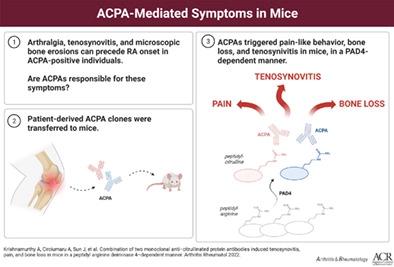当前位置:
X-MOL 学术
›
Arthritis Rheumatol.
›
论文详情
Our official English website, www.x-mol.net, welcomes your
feedback! (Note: you will need to create a separate account there.)
Combination of Two Monoclonal Anti–Citrullinated Protein Antibodies Induced Tenosynovitis, Pain, and Bone Loss in Mice in a Peptidyl Arginine Deiminase-4–Dependent Manner
Arthritis & Rheumatology ( IF 11.4 ) Pub Date : 2022-08-05 , DOI: 10.1002/art.42320 Akilan Krishnamurthy 1 , Alexandra Circiumaru 1 , Jitong Sun 1 , Yogan Kisten 1 , Peter Damberg 2 , Koji Sakuraba 1 , Katalin Sandor 3 , Patrik Jarvoll 2 , Tunhe Zhou 4 , Vivianne Malmström 1 , Camilla I Svensson 3 , Aase Hensvold 1 , Anca I Catrina 1 , Lars Klareskog 1 , Bence Réthi 1
Arthritis & Rheumatology ( IF 11.4 ) Pub Date : 2022-08-05 , DOI: 10.1002/art.42320 Akilan Krishnamurthy 1 , Alexandra Circiumaru 1 , Jitong Sun 1 , Yogan Kisten 1 , Peter Damberg 2 , Koji Sakuraba 1 , Katalin Sandor 3 , Patrik Jarvoll 2 , Tunhe Zhou 4 , Vivianne Malmström 1 , Camilla I Svensson 3 , Aase Hensvold 1 , Anca I Catrina 1 , Lars Klareskog 1 , Bence Réthi 1
Affiliation

|
The appearance of anti–citrullinated protein antibodies (ACPAs) in the circulation represents a major risk factor for developing rheumatoid arthritis (RA). Patient-derived ACPAs have been shown to induce pain and bone erosion in mice, suggesting an active role in the pathogenicity of RA. We undertook this study to investigate whether ACPAs can induce tenosynovitis, an early sign of RA, in addition to pain and bone loss and whether these symptoms are dependent on peptidyl arginine deiminase 4 (PAD4).
中文翻译:

两种单克隆抗瓜氨酸蛋白抗体的组合以肽基精氨酸脱亚胺酶 4 依赖性方式诱导小鼠腱鞘炎、疼痛和骨质流失
循环中出现抗瓜氨酸蛋白抗体 (ACPA) 是发生类风湿性关节炎 (RA) 的主要危险因素。患者来源的 ACPA 已被证明会引起小鼠疼痛和骨侵蚀,表明在 RA 致病性中发挥着积极作用。我们进行这项研究是为了调查除了疼痛和骨质流失之外,ACPA 是否还会诱发腱鞘炎(RA 的早期症状),以及这些症状是否依赖于肽基精氨酸脱亚胺酶 4 (PAD4)。
更新日期:2022-08-05
中文翻译:

两种单克隆抗瓜氨酸蛋白抗体的组合以肽基精氨酸脱亚胺酶 4 依赖性方式诱导小鼠腱鞘炎、疼痛和骨质流失
循环中出现抗瓜氨酸蛋白抗体 (ACPA) 是发生类风湿性关节炎 (RA) 的主要危险因素。患者来源的 ACPA 已被证明会引起小鼠疼痛和骨侵蚀,表明在 RA 致病性中发挥着积极作用。我们进行这项研究是为了调查除了疼痛和骨质流失之外,ACPA 是否还会诱发腱鞘炎(RA 的早期症状),以及这些症状是否依赖于肽基精氨酸脱亚胺酶 4 (PAD4)。











































 京公网安备 11010802027423号
京公网安备 11010802027423号